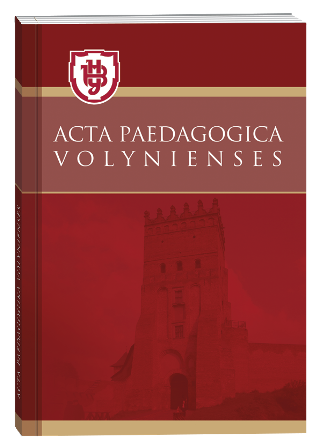ПЕДАГОГІЧНА ПРАКТИКА ЯК ЕТАП ПРОФЕСІЙНОГО СТАНОВЛЕННЯ МАЙБУТНЬОГО ФІЛОЛОГА
DOI:
https://doi.org/10.32782/apv/2025.1.28Ключові слова:
педагогічна практика, філологія, майбутній філолог, компетентність, педагогічна діяльністьАнотація
Актуальність проблеми зумовлена необхідністю підготовки висококваліфікованих педагогічних кадрів, здатних ефективно працювати у сфері освіти. У статті зазначено, що педагогічна практика відіграє ключову роль у професійному становленні майбутніх філологів, забезпечуючи інтеграцію теоретичних знань та практичних навичок у сфері викладання мовних і літературних дисциплін. Проаназізовано як вона сприяє розвитку методичної компетентності, педагогічного мислення, комунікативних здібностей та формуванню власного стилю викладання. Студенти отримують можливість застосувати отримані знання в реальних умовах навчального процесу, що сприяє їхній адаптації до майбутньої професійної діяльності.Методологічним підґрунтям дослідження стали теоретико-методичні напрацювання лінгводидактів, психолінгвістів, філологів, які акцентують увагу на вдосконаленні педагогічної майстерності, формуванні лінгводидактичної компетентності та розробці сучасних методичних підходів. Їхні дослідження підтверджують, що педагогічна практика є невід’ємною частиною підготовки вчителів-словесників. Авторками статті проаналізовано кілька ключових етапів педагогічної практики, серед яких пропедевтична практика, практика в закладах загальної середньої освіти та практика з виховної роботи. У статті зазначається, що кожен із цих етапів спрямований на поступове занурення студентів у педагогічну діяльність та формування необхідних професійних компетентностей. Зокрема, студенти вчаться аналізувати навчальний процес, використовувати інноваційні методи викладання, адаптуватися до психологічних особливостей учнів та здійснювати виховну роботу. Особливе значення має розвиток рефлексивних навичок, що дозволяють майбутнім педагогам аналізувати власну діяльність, виявляти сильні та слабкі сторони, а також вдосконалювати професійні уміння. Дослідження показують, що ефективно організована педагогічна практика, яка має прямий зв’язок із теорією, є важливим чинником підвищення якості підготовки майбутніх учителів. У статті зроблені виважені висновки. Акцентовано, що педагогічна практика не лише забезпечує засвоєння теоретичних знань, а й формує професійну ідентичність майбутнього філолога, сприяючи його готовності до успішної роботи у сфері освіти.
Посилання
Білоконний С. Організація керівництва педагогічною практикою – важлива умова формування рефлексив- них умінь майбутнього вчителя. Вісник Черкаського національного університету : зб. наук. статей. Черкаси, 2008. № 142. С. 5–8.
Казанішена Н. Педагогічна практика як складова процесу підготовки майбутнього вчителя початкової школи до екологічного виховання учнів. Науковий збірник Уманського державного педагогічного університету. Умань : УДПУ, 209. № 30. С. 25–34.
Кара С. Організація керівництва педагогічною практикою – важлива умова формування професійної компетентності студентів. Рідна школа. 2006. № 6. С. 11–13.
Остапенко Н. Лінгводидактичні компетентності як основа професійно-педагогічної діяльності майбутніх учителів-філологів. Українська мова і література в школі. № 4. 2006. С. 44–48.
Семеног О., Базиль Л., Дятленко Т. Фахова практика вчителя-словесника : [навчальний посібник]. Луганськ : Вид-во «Ноулідж» , 2011. 496 с.
Сидоренко В., Кулішов В., Торба Н. Інноваційні підходи до організації видів практик здобувачів вищої освіти в період воєнного стану. Вісник Національної академії наук Україна заг. наук. журнал. № 5, 2023. С 1–15.
Сорочан Т., Данильєв А., Дьяченко Б., Рудіна О. Професійний розвиток керівників і педагогічних працівників загальноосвітніх навчальних закладів у післядипломній педагогічній освіті регіонального рівня (за матеріалами Луганського обласного інституту післядипломної педагогічної освіти). Луганськ : СПД Рєзніков В., 2013. 524 с.
Komar W. Współczesność i nauczyciel. Perspektywy edukacji bez dogmatów. Warszawa: Żak. 2000.
Kozłowski J. Praktyka pedagogiczna, jej zakres i funkcje w procesie przygotowania do zawodu. Ruch Pedagogiczny, nr 2. 1962.
Kuźma J. Praktyki pedagogiczne i dydaktyczne jako jedność teorii i praktyki. W: T. Pilch (red.), Encyklopedia pedagogiczna XXI wieku. Warszawa : Żak. 2005.
Pituła B. „Praktyka czyni mistrza”, czyli o przygotowaniu zawodowym studentów kierunków pedagogicznych. Raporty – opinie – propozycje zmian. Katowice: Śląska Wyższa Szkoła Zarządzania im. gen. Jerzego Ziętka. 2014.
Polak B. Podstawy teorii kształcenia. Szczecin: Szczecińska Szkoła Wyższa Collegium Balticum. 2013.
Żuchelkowska K. Praktyki pedagogiczne i ich rola w kształceniu kandydatów na nauczycieli. W: B. Moraczewska, M. Krzemiński (red.), Praktyki pedagogiczne ważnym ogniwem w procesie kształcenia nauczycieli edukacji wczesnoszkolnej i przedszkolnej. T. 1, Teoretyczne i praktyczne aspekty kształcenia nauczycieli edukacji wczesnoszkolnej i przedszkolnej. Włocławek: Państwowa Wyższa Szkoła Zawodowa. 2012.







